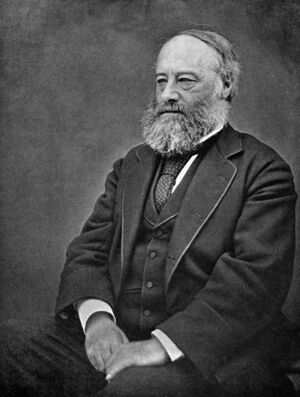James Prescott Joule (nonfiction): Difference between revisions
Jump to navigation
Jump to search
No edit summary |
No edit summary |
||
| Line 1: | Line 1: | ||
[[File:James_Prescott_Joule.jpg|thumb|James Prescott Joule.]]'''James Prescott Joule''' FRS HFRSE DCL LLD (24 December 1818 – 11 October 1889) was an English physicist and brewer, born in Salford, Lancashire. | [[File:James_Prescott_Joule.jpg|thumb|James Prescott Joule.]]'''James Prescott Joule''' FRS HFRSE DCL LLD (24 December 1818 – 11 October 1889) was an English physicist and brewer, born in Salford, Lancashire. | ||
Joule studied the nature of heat, and discovered its relationship to mechanical work | Joule studied the nature of heat, and discovered its relationship to mechanical work. This led to the law of conservation of energy, which led to the development of the first law of thermodynamics. | ||
He worked with [[William Thomson, 1st Baron Kelvin (nonfiction)|Lord Kelvin]] to develop the absolute scale of temperature, which came to be called the Kelvin scale. | He worked with [[William Thomson, 1st Baron Kelvin (nonfiction)|Lord Kelvin]] to develop the absolute scale of temperature, which came to be called the Kelvin scale. | ||
Revision as of 15:54, 19 March 2017
James Prescott Joule FRS HFRSE DCL LLD (24 December 1818 – 11 October 1889) was an English physicist and brewer, born in Salford, Lancashire.
Joule studied the nature of heat, and discovered its relationship to mechanical work. This led to the law of conservation of energy, which led to the development of the first law of thermodynamics.
He worked with Lord Kelvin to develop the absolute scale of temperature, which came to be called the Kelvin scale.
Joule also made observations of magnetostriction, and he found the relationship between the current through a resistor and the heat dissipated, which is now called Joule's first law.
The SI derived unit of energy, the joule, is named after him.
In the News
Fiction cross-reference
Nonfiction cross-reference
External links:
- James Prescott Joule @ Wikipedia
